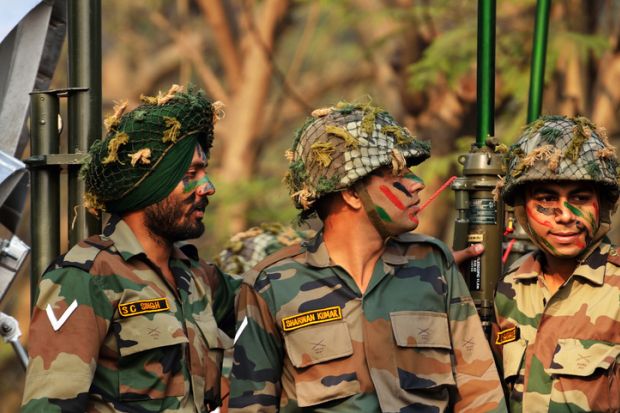If you’re not familiar with military life, it’s easy to think the “just do it” style of barking orders is the dominant form of leadership. For academics used to working in institutions where democratic governance, collegiality and free-thinking are celebrated, yet increasingly challenged, this top-down style of management could not be less welcome.
But that perception of military top brass grossly misrepresents how leadership in the armed forces works in most situations. Officers are certainly aware that terse commands must be used sparingly with recruits. As an Indian Army veteran, where I led troops from the front before joining major corporations as a chief human resources officer, and later becoming a business school professor, I would argue that higher education leadership has much to learn from the military.
A gentleman first, officer later
In the army, the phrase “a gentleman first, officer later” is well known, though I’d adapt it to the gender-inclusive “gentleperson” since the induction of women to the military. Who is a gentleperson? One who can be trusted. How is trust built? By speaking what one means, meaning what one speaks, and acting on what one speaks.
This authenticity and harmony in thought, speech and actions result in trustworthiness and strong character – vital attributes for exercising leadership. When people in leadership roles fail to honour commitments, manipulate or deceive, they certainly do not exercise leadership. Through social learning, faculty and students often consider the manipulative behaviour of some pseudo-leaders within academia as a norm and naively seek to emulate them. The losers are society and industry, who find unethical leaders rising within corporations.
Civility and caring for team members
The Indian defence forces operate on the Chetwode Motto: a) The safety, honour and welfare of your country come first, always and every time; b) The honour, welfare and comfort of the men you command come next; c) Your own ease, comfort and safety come last, always and every time.
In the higher education context, incivility and arrogance manifest in pseudo-leaders not responding to emails, not taking or returning calls, not giving feedback to any professional request made, deputing on important assignments by emails and without having a word on them, victimising for giving an idea in a meeting that does not align with the myopic world view of the pseudo-leader, and making selective minutes of the meeting. These subtle forms of uncivil and uncaring behaviour are unthought of in the military for exercising effective leadership.
Orders I can myself deliver
The principle of not giving orders that one cannot oneself do brings realism and humanism to expectations from team members. Leaders in the military adhere to the value of either having done or possessing the efficacy to do what is instructed to the team members.
Do not misunderstand me. I am all for stretched goals – often seemingly impossible goals. But in the military, these stretched goals are led from the front, instilling confidence in team members, infusing them with pride and providing them with an opportunity to learn. When true leadership is exercised, the achievement of stretched goals is stress-free, liberating and joyous. By applying a body of knowledge and appropriate management principles and practices, one often achieves more than one would deliver without their application. This brings us to the next important principle of the military that business schools can learn from and adopt – professionalism.
Professionalism
For business schools, George Bernard Shaw’s astute observation that “those who can, do; those who can’t, teach” often rings true. Many business schools teaching management themselves have rudimentary management practices. For instance, the jobs are not evaluated, resulting in huge variations and unfairness in compensation; vision, mission and values are mere ritualistic ornaments and are not deployed in organisational processes.
I have yet to see a robust strategy document of a business school – most flaunt a set of few disconnected activities as the strategy. Knowing one’s job, following the body of knowledge and keeping oneself abreast of the latest developments in the field are fundamental to leading troops in the army.
Fair practices
Fair play is essential when dispensing justice. A biased person might operate on the flawed principle of “tell me the person and I will tell you the rule”, but this does not inspire confidence. Moreover, it results in opportunistic behaviour that is anything but leadership.
To create an impression of effective management, business school leaders can sometimes unleash a flurry of mindless and non-strategic activities that are little more than an effort to seek employees’ unquestioning compliance. In return, the faculty and staff who respond are rewarded with sabbaticals, generous leave or leniency for on-duty approvals. While all make merry, the organisation suffers. This leads to increased efforts to unethically distort impressions via an excessive presence in social media. At work, fairness stems from merit-focused and professional-based decisions.
These lessons matter because, globally, leadership in higher education is currently going through an unprecedented crisis. In some business schools in India where I have experience, some leaders glory in making a virtue of unethical actions. Instead of designing a robust academic curriculum, some decide to create deceptive impressions by yielding to paid rankings, publications or awards, or immorally attempting to influence accreditation bodies – all of which is narrowly aimed at recruiting gullible students.
Equally bad is the misuse of power to silence internal discussions on unethical and poor management practices or to suppress free thought. This mistakes dissatisfaction from colleagues as disruptive dissent, rather than being vital signals for dialoguing, developing understanding and correcting unethical practices.
When a military officer exercises leadership, it is not just to get work done but often to risk one’s life for a cause. I have risked my life for upholding a value when none of my seniors were watching on many occasions, nor did they ever come to know about it. University leaders do not need to risk their lives like soldiers, but they could still learn much from the basic lessons of military leadership.
Vikas Rai Bhatnagar is chief executive officer at Hyperspace Action Research Services and a former professor of general management and chairperson of doctoral studies at Lal Bahadur Shastri Institute of Management, New Delhi, India.
Register to continue
Why register?
- Registration is free and only takes a moment
- Once registered, you can read 3 articles a month
- Sign up for our newsletter
Subscribe
Or subscribe for unlimited access to:
- Unlimited access to news, views, insights & reviews
- Digital editions
- Digital access to THE’s university and college rankings analysis
Already registered or a current subscriber? Login








